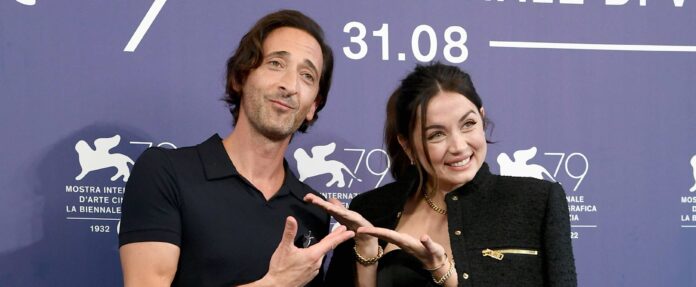ON THIS PAGE
- The Matchmaker, in conversation with the director Benedetta Argentieri
- The stars of Blonde: De Armas, Dominik, Brody
-
Iran and the fear of the independent filmmakers
The Matchmaker, in conversation with the director Benedetta Argentieri.
“I have been dealing with the issue of women in Isis since 2015, and from the beginning it was clear to me how their narrative in the Western mainstream media was completely distorted.” Benedetta Argentieri, independent journalist, documentary filmmaker, and director of The Matchmaker, presented Out of Competition at the Lido yesterday. Argentieri spent 11 months in Syria to shoot this doc, where she chronicles the phenomenon of Western women joining the Caliphate during the conflict in Syria. Without using the usual stereotypes that want these people to be either fanatical murderers or submissive victims without nuance. But why has this kind of narrative appealed so much to us? “On one hand,” according to Argentieri, “there is still a very sexist view, so we often think of women in the Middle East as ‘veiled victims.’ And then it is more reassuring to believe that a woman has not ideologically joined such a terrorist group. And they, who understood this game early on, pretend to be victims because they hope that way they will not have to take responsibility.” It also applies to Tooba Gondal, the Isis recruiter who fled London at age 21. Argentieri interviewed her in a prison camp in northeastern Syria. “It was challenging,” the filmmaker confesses, not least because “it took us a month and a half to get in, not counting the 50-degree temperature and the machines going off.” And, as the doc well shows us, the thousands detained in these camps after the defeat of the Islamic State call into question the Western countries that still do not repatriate them. “You create a limbo that fuels extremism,” the filmmaker points out. “How can you refuse to readmit your citizens? Then what does it mean to be a citizen of a state? It is a perilous precedent.” The alternative would be to establish an international tribunal there, “but Turkey does not want it because it would mean recognizing the Autonomous Administration of Northeast Syria.” Not surprisingly, the film also dwells on Erdogan’s war against those territories, with Western allies abandoning Kurdish (and other) militias after fighting the Caliphate. “Hundreds of Isis militiamen escaped thanks to Turkey, which financed the Islamic State. It is not coming from me but intelligence agencies such as the CIA. The point, however, is that Europe is very weak, and to stop the migratory flows it would do anything.”
Emanuele Bucci
The stars of Blonde: De Armas, Dominik, Brody
Andrew Dominik: “There are stories that convey great emotion to you, projects that hold your attention for years. Blonde will never let me go: I stayed attached to this project even when I couldn’t get to the bottom of it.”
Ana de Armas: “If you put aside the movie star Marilyn Monroe, she was just a woman like me. Same age, same profession. I immersed myself in a very long process to connect with her. I went to dark, vulnerable and uncomfortable places. I wanted to find her emotional truth. Through this role I learned to be more empathetic, to have more respect, but also to protect myself more.”
Adrien Brody: “Brave films like Blonde are essential to be aware of women’s struggle over time. I’ve always loved Marylin Monroe: her recognition was far from what she was. Many actors can relate to this gap between adoration and respect.”
Iran and the fear of the independent filmmakers
“There is a price to pay in Iran for working independently from the government,” Jafar Panahi declared in 2004 in an interview. “Propaganda against the regime” is precisely the crime for which, back in 2010 (after participating in a demonstration against then-President Ahmadinejad) he was sentenced in his country to six years in prison, which he will now have to serve after his new arrest. But though absent, Panahi is making his voice heard at Venice 79, not only through the film in competition but also through a statement issued with fellow filmmaker Mohammad Rasoulof (Golden Bear for The Evil Doesn’t Exist), who was also arrested in July and repeatedly censured and convicted. “Independent cinema reflects its times, draws inspiration from society and cannot remain indifferent,” the two filmmakers say. Not surprisingly, the screening of No Bears at the Lido will be preceded by a flash mob on the red carpet of the Palazzo del Cinema, to draw the spotlight on the drama of imprisoned and persecuted filmmakers worldwide.
Emanuele Bucci

